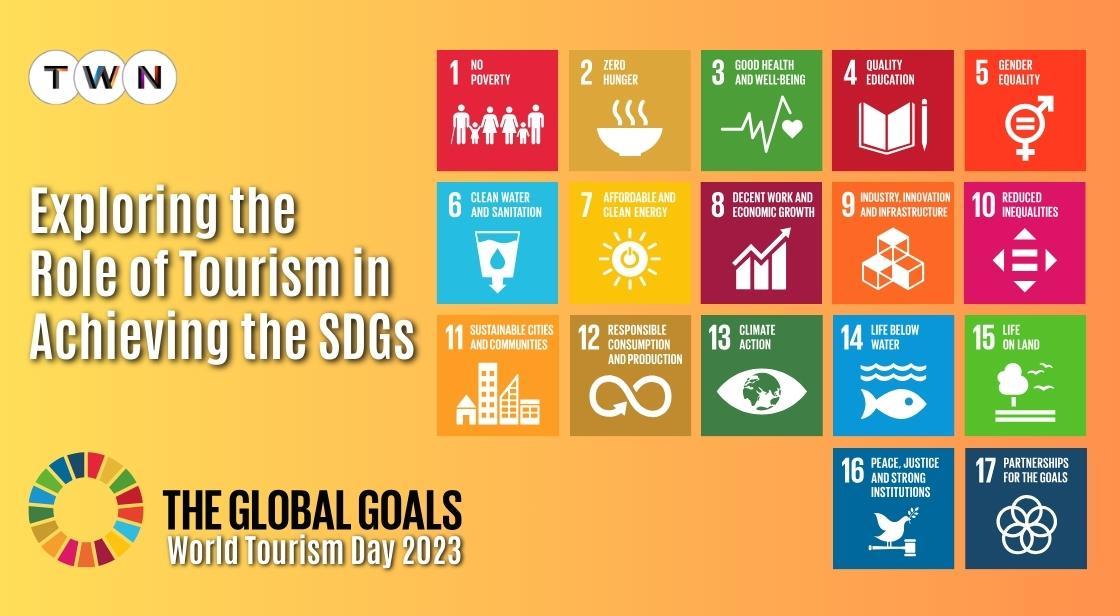World Tourism Day 2023: Exploring the Role of Tourism in Achieving the SDGs

Blog Post
World Tourism Day, celebrated annually on September 27th, is a momentous occasion that underscores the vital role of tourism in our globalized world. It's a day to reflect on how tourism impacts our economies, cultures, and environments, and how it can be harnessed as a powerful catalyst for sustainable development.
In 2023, under the theme of "Tourism and Green Investments," we delve into how this industry can be transformed to align with the Sustainable Development Goals (SDGs) and usher in a future where tourism is both sustainable and inclusive.
Tourism isn't just about visiting new places; it's a multifaceted force that influences society on numerous levels. It can create livelihoods, protect cultural heritage, promote conservation, and bridge gaps between cultures.
The potential for tourism to contribute to all 17 SDGs is increasingly recognized, making it a linchpin for global development. However, this potential can only be fully realized through sustainable and inclusive practices.
This blog post explores the role of tourism in achieving the SDGs, highlighting specific examples and initiatives that exemplify how tourism can create a better world for all.
We'll discuss the theme for World Tourism Day 2023, "Tourism and Green Investments," and elaborate on how these investments can drive positive change. Moreover, we'll delve into the history of World Tourism Day and provide practical suggestions on how individuals and organizations can celebrate this day and contribute to the cause of sustainable tourism.
Let's embark on a journey to understand how tourism, when reimagined and restructured, can be a key driver in shaping a more sustainable and equitable future.
Tourism has the potential to contribute to all 17 Sustainable Development Goals (SDGs), and is increasingly being recognized as a key driver of sustainable development. On World Tourism Day 2023, let's explore the role of tourism in achieving the SDGs and how we can work together to make tourism more sustainable and inclusive.
World Tourism Day is celebrated annually on September 27 to raise awareness about the importance of tourism and its impact on the global economy, culture, and environment.
Tourism is a powerful sector that can contribute to sustainable development in a number of ways. It can create jobs, generate revenue, protect cultural heritage, and promote environmental conservation.
However, it is important to ensure that tourism is developed and managed in a sustainable way, so that it can benefit all stakeholders, including local communities, businesses, and the environment.
World Tourism Day 2023 Theme
The United Nations World Tourism Organization (UNWTO) has chosen the theme "Tourism and Green Investments" for World Tourism Day 2023. This theme highlights the critical need for increased and targeted investments in sustainable tourism to achieve the Sustainable Development Goals (SDGs).
SDGs are a global call to action to address the world's most pressing challenges, including poverty, inequality, climate change, and environmental degradation. Tourism has the potential to contribute to all 17 SDGs, but it is essential to ensure that tourism is developed and managed in a sustainable way.
Green investments in tourism are those that support the transition to a more sustainable and resilient tourism sector. This can include investments in renewable energy, energy efficiency, water conservation, waste management, and sustainable transportation. It can also include investments in protecting and restoring natural and cultural heritage.
There are many benefits to investing in green tourism. It can help to create jobs, generate revenue, reduce poverty, and improve the quality of life for local communities. It can also help to protect the environment and mitigate climate change.
The UNWTO is calling on all stakeholders in the tourism sector to embrace green investments. This includes governments, businesses, investors, and tourists. Governments can create enabling policies and incentives to promote green investments. Businesses can invest in green technologies and practices. Investors can invest in green tourism projects. And tourists can choose to travel to destinations that are committed to sustainability.
By working together, we can create a more sustainable and equitable tourism sector that benefits all stakeholders and helps to achieve the SDGs.
Here are some specific examples of green investments in tourism:
-
Investing in renewable energy for hotels and other tourism businesses.
-
Investing in energy-efficient appliances and equipment for hotels and other tourism businesses.
-
Investing in water conservation systems for hotels and other tourism businesses.
-
Investing in waste management systems for hotels and other tourism businesses.
-
Investing in sustainable transportation options for tourists, such as electric buses and bicycles.
-
Investing in protecting and restoring natural and cultural heritage sites.
Green investments in tourism can make a significant contribution to achieving a more sustainable future for the sector.
History of World Tourism Day
World Tourism Day is celebrated annually on September 27 to raise awareness about the importance of tourism and its impact on the global economy, culture, and environment. The date was chosen because it coincides with the anniversary of the adoption of the Statutes of the United Nations World Tourism Organization (UNWTO) on September 27, 1970.
The idea for World Tourism Day was first proposed in 1979 by Ignatius Amaduwa Atigbi, a Nigerian national who was working as a tourism officer at the UNWTO at the time. Atigbi's proposal was approved by the UNWTO General Assembly in 1980, and the first World Tourism Day was celebrated on September 27, 1980.
Since then, World Tourism Day has been celebrated annually in over 100 countries around the world. Each year, the UNWTO chooses a theme for World Tourism Day to highlight a specific aspect of tourism. For example, the themes for World Tourism Day in recent years have included:
-
Tourism and Rural Development (2022)
-
Tourism for Inclusive Growth (2021)
-
Better Tourism (2020)
-
Tourism and Sustainable Energy (2019)
World Tourism Day is a celebration of the many benefits of tourism. Tourism can create jobs, generate revenue, promote cultural understanding, and protect natural and cultural heritage. It can also play a role in sustainable development, by creating opportunities for local communities and helping to conserve the environment.
On World Tourism Day, people around the world come together to celebrate the importance of tourism and to raise awareness about the need to make tourism more sustainable and inclusive.
How to celebrate World Tourism Day:
-
Learn more about the history and culture of your own community.
-
Visit a local museum or historical site.
-
Support local businesses, such as restaurants and hotels.
-
Be respectful of the environment and local culture when you travel.
-
Encourage others to travel sustainably and responsibly.
World Tourism Day 2023: Exploring the Role of Tourism in Achieving the SDGs
How tourism can contribute to the SDGs:
Here are some specific examples of how tourism can contribute to the SDGs:
SDG 1: No Poverty
Tourism can create jobs and generate revenue for local communities, especially in developing countries.
-
Tourism has the power to alleviate poverty by creating income-generating opportunities, particularly in rural and underserved areas.
-
Community-based tourism initiatives empower marginalized populations and promote inclusive growth.
For example, in Kenya, tourism accounts for over 10% of GDP and employs over 1 million people. In Cambodia, tourism accounts for over 20% of GDP and employs over 500,000 people.
Quality Education (SDG 4):
-
Tourism fosters cross-cultural understanding and learning, contributing to quality education.
-
Educational travel experiences, such as cultural exchanges and study tours, promote global citizenship and cultural awareness.
Gender Equality (SDG 5):
-
Tourism can advance gender equality by providing employment and leadership opportunities for women. Women make up the majority of the tourism workforce.
-
Programs promoting gender diversity in tourism leadership positions are essential for achieving this goal.
SDG 8: Decent Work and Economic Growth
Tourism can support sustained, inclusive, and sustainable economic growth.
-
Tourism contributes significantly to economic growth by generating jobs and revenue. In 2021, tourism contributed 10.4% of the world's GDP, providing employment for one in ten people globally.
-
Sustainable tourism practices can enhance the livelihoods of local communities and support small and medium-sized enterprises (SMEs).
For example, in the United States, tourism contributes over $1.9 trillion to the economy and supports over 16 million jobs. In China, tourism contributes over $1.1 trillion to the economy and supports over 78 million jobs.
Also Read: Climate Change and its Impact on Global Business Landscape
SDG 10: Reduced Inequalities
Tourism can help to reduce inequalities within and between countries by creating opportunities for all, regardless of gender, race, or socioeconomic status. For example, in South Africa, tourism has helped to empower women and youth by creating new jobs and businesses. In Mexico, tourism has helped to reduce poverty and inequality in rural communities.
SDG 11: Sustainable Cities and Communities
Tourism can promote sustainable urbanization and support the conservation and sustainable use of cultural and natural heritage. For example, in Barcelona, Spain, tourism has helped to revitalize the city center and promote sustainable transportation options. In Kyoto, Japan, tourism has helped to preserve the city's traditional culture and architecture.
SDG 12: Responsible Consumption and Production
Tourism can promote sustainable consumption and production patterns, such as reducing waste and pollution. For example, many hotels and resorts are now adopting sustainable practices, such as using renewable energy, reducing water consumption, and recycling. Many tourists are also becoming more conscious of their environmental impact when they travel.
SDG 13: Climate Action
Tourism can contribute to climate action by reducing its carbon footprint and investing in renewable energy.
-
Sustainable tourism practices aim to reduce the industry's carbon footprint.
-
Initiatives like eco-friendly accommodations, low-impact transportation, and carbon offset programs are crucial in mitigating climate change.
For example, many airlines are now using more fuel-efficient aircraft and investing in biofuels. Many hotels and resorts are also switching to renewable energy sources and adopting energy-efficient practices.
SDG 14: Life Below Water
Tourism can promote the conservation and sustainable use of marine resources. For example, many tour operators are now offering sustainable tourism experiences, such as snorkeling and diving trips that are designed to minimize the impact on marine ecosystems. Many tourists are also becoming more aware of the importance of protecting marine life.
SDG 15: Life on Land
Tourism can promote the conservation and sustainable use of terrestrial ecosystems and biodiversity. For example, many national parks and wildlife sanctuaries are now relying on tourism revenue to support their conservation efforts. Many tourists are also becoming more interested in ecotourism experiences, such as nature walks and wildlife safaris.
SDG 17: Partnerships for the Goals
Tourism can promote global partnerships for sustainable development. For example, the UNWTO has partnered with the World Bank and the Global Environment Facility to launch the Green Growth Action Plan for Tourism, which is a global initiative to promote sustainable tourism development.
Examples of sustainable tourism initiatives:
-
The Global Sustainable Tourism Council (GSTC) is a non-profit organization that provides certification for sustainable tourism businesses.
-
The International Tourism Partnership (ITP) is a business-led network that works to promote sustainable tourism.
-
The World Tourism Organization (UNWTO) has a number of programs and initiatives that promote sustainable tourism, such as the Sustainable Tourism Development Programme and the Global Code of Ethics for Tourism.
Making tourism more sustainable and inclusive:
There are a number of things that can be done to make tourism more sustainable and inclusive, such as:
-
Promoting sustainable tourism practices: This includes things like reducing waste and pollution, using renewable energy, and supporting local businesses.
-
Investing in sustainable tourism infrastructure: This includes things like developing public transportation, building green hotels, and protecting natural areas.
-
Educating tourists and local communities: This is important to raise awareness about the importance of sustainable tourism and to ensure that everyone is involved in the sustainable development of tourism.
Latest and updated data and facts on Tourism
-
According to the World Tourism Organization (UNWTO), tourism contributed 10.4% of global GDP in 2019.
-
Tourism is a major source of employment, supporting over 330 million jobs worldwide.
-
Tourism is a key driver of sustainable development, and can contribute to all 17 SDGs.
Conclusion:
Tourism has the potential to make a significant contribution to the achievement of the SDGs. However, it is important to ensure that tourism is developed and managed in a sustainable and inclusive way. By working together, we can create a more sustainable and equitable tourism sector that benefits all stakeholders.
You May Like
EDITOR’S CHOICE












